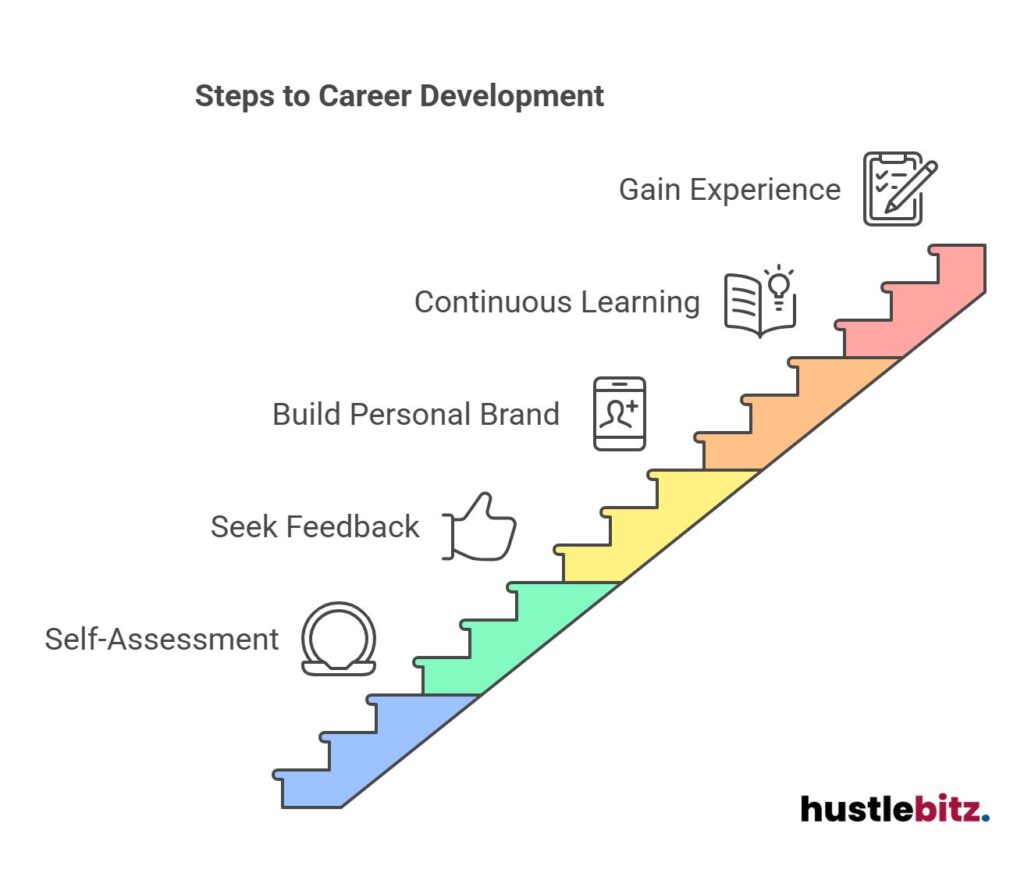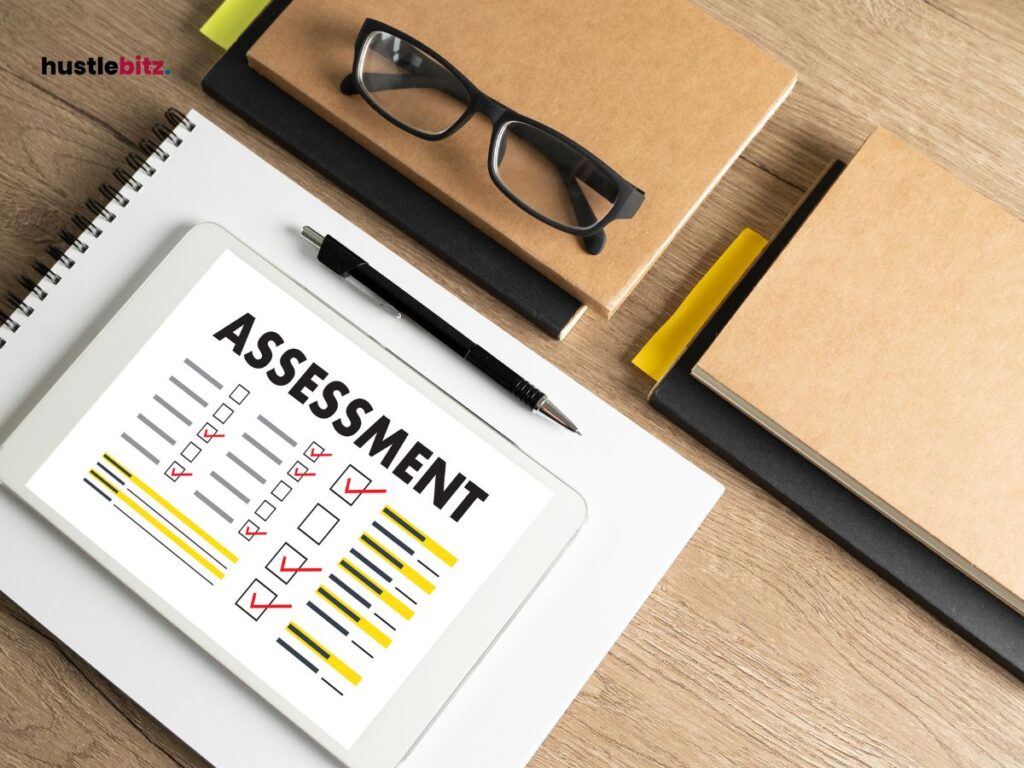To advance your career skills, focus on self-assessment and soliciting feedback to identify growth areas. Building a personal brand is essential for showcasing your unique value. Engage in continuous learning through courses and workshops to stay relevant. Networking plays a critical role; foster connections with professionals in your field for insights and opportunities. Additionally, gaining practical experience through internships or freelance projects enhances your employability. Finally, developing soft skills such as communication and adaptability is vital for workplace success. Exploring these strategies will further enrich your professional journey and provide deeper insights.
Key Takeaways
- Conduct regular self-assessments to identify strengths and areas for growth to align your career goals with professional development efforts.
- Seek constructive feedback from peers to inform actionable steps for improvement and foster a commitment to continuous growth.
- Build and maintain a strong personal brand through platforms like LinkedIn to communicate your unique skills and experiences effectively.
- Engage in continuous learning by taking online courses and reading industry-related materials to stay informed about trends and enhance your skill set.
- Gain practical experience through internships, volunteering, or freelance projects to apply theoretical knowledge and improve employability.

Mastering the Art of Self-Assessment

To effectively navigate your career path, mastering the art of self-assessment is essential, as it allows you to identify your strengths, weaknesses, and areas for growth. This critical process involves a thorough evaluation of your skills and knowledge, enabling you to pinpoint what you excel at and where improvement is necessary. Engaging in regular self-assessment not only informs your current capabilities but also highlights the gaps that may hinder your career growth.
By understanding your unique skill set, you can align your professional development efforts with your career goals. This alignment ensures that you are investing time and resources into acquiring skills that will propel you forward in your chosen field. For instance, if you discover that public speaking is a weakness, you can seek training or mentorship in this area to enhance your abilities.
Moreover, self-assessment fosters a growth mindset, encouraging you to view challenges as opportunities for learning rather than obstacles. By actively seeking feedback from colleagues and supervisors, you gain valuable insights that further refine your self-awareness. This feedback loop enhances your ability to adapt and grow within your profession, positioning you as a proactive and engaged employee.
Ultimately, mastering self-assessment is a foundational element of effective career management. It empowers you to make informed decisions about your professional development, ensuring that your career trajectory aligns with your aspirations and maximizes your potential.
Building a Personal Brand

Understanding your strengths and areas for growth through self-assessment lays the groundwork for effectively building a personal brand that resonates with your professional identity and goals. A strong personal brand communicates your unique value proposition, showcasing your professional skills and distinguishing you in a competitive job market.
To foster personal and professional growth, begin by identifying the core attributes that define your expertise and experiences. This clarity enables you to articulate your narrative persuasively, establishing a credible presence in your field. Your personal brand should reflect not only what you do but also how you do it, encompassing both your technical skills and interpersonal qualities.
Next, leverage development opportunities that align with your career advancement objectives. Engage in continuous learning through workshops, online courses, or certifications that enhance your skills and expand your knowledge base. This commitment to growth not only enriches your capabilities but also reinforces your brand as someone dedicated to excellence.
Moreover, be intentional about your online presence. Utilize professional platforms like LinkedIn to share insights, achievements, and thought leadership within your industry. Consistency in messaging and visuals across platforms fosters recognition and trust, essential components of a personal brand.
Ultimately, building a personal brand is an ongoing process that requires reflection, adaptation, and proactivity. As you cultivate this brand, you position yourself for greater career advancement and opportunities, ensuring that you remain relevant in an ever-evolving professional landscape.
Networking for Success
Building a robust professional network is essential for unlocking new opportunities and accelerating career growth. A well-established professional network serves as a powerful resource in your career development journey, providing access to valuable insights, mentorship, and potential job prospects. By actively engaging with others in your field, you can enhance your skills to succeed and stay informed about industry trends.
To effectively network, start by identifying individuals who share your career interests or hold positions that inspire you. Utilize platforms like LinkedIn to connect with peers, industry leaders, and alumni, fostering relationships that can lead to fruitful collaborations. Attend networking events, workshops, or local meetups where like-minded professionals congregate, as these settings provide an opportunity to exchange ideas and establish rapport.
Moreover, remember that networking is not a one-time event but an ongoing process. Continuously nurture your professional network by maintaining regular communication, offering assistance, and sharing relevant resources. By becoming a valuable contact yourself, you enhance your reputation and encourage others to reciprocate.
As you build your network, be open to exploring diverse career opportunities. Engaging with individuals from various backgrounds can provide fresh perspectives and novel approaches to problem-solving. Ultimately, a robust professional network not only supports your immediate goals but also contributes to long-term career success, ensuring you remain adaptable and prepared for future challenges in your industry.
Attend Industry Conferences

Attending industry conferences represents a powerful opportunity to expand your professional network while gaining insights into the latest trends and innovations in your field. By participating in these events, you can engage with thought leaders, industry experts, and peers who share your interests and aspirations. This interaction not only enhances your knowledge but also opens doors to numerous career growth opportunities.
Conferences often feature workshops, panel discussions, and networking sessions that facilitate learning and development. These experiences allow you to acquire new skills and perspectives, which are vital for professional growth. Additionally, being present at industry events can significantly increase your visibility within your professional community, enhancing your prospects for career advancement opportunities.
Here is a summary of key benefits of attending industry conferences:
| Benefits | Description |
| Networking Opportunities | Connect with peers and industry experts. |
| Knowledge Gain | Learn about the latest trends and technologies. |
| Skill Development | Participate in workshops and hands-on sessions. |
| Career Advancement | Discover job openings and mentorship possibilities. |
| Professional Visibility | Enhance your presence within your industry. |
Engage in Continuous Learning
Engaging in continuous learning is essential for professionals seeking to adapt to the rapidly evolving demands of their industries. As technological advancements and market trends shift, the ability to enhance your skills and knowledge becomes critical for career advancement. Continuous learning not only keeps you relevant but also empowers you to acquire the skills you want to excel in your field.
One effective way to pursue continuous learning is through online courses. These platforms provide accessible resources that cover a wide range of topics, allowing you to tailor your learning experience according to your career goals. Whether you aim to master new software, improve managerial skills, or delve into industry-specific knowledge, online courses can facilitate your journey toward professional growth.
Additionally, many organizations offer career development programs that focus on continuous learning. These initiatives often include workshops, webinars, and mentorship opportunities, all designed to foster skill enhancement and knowledge acquisition. By actively participating in these programs, you can not only expand your expertise but also network with professionals who share similar aspirations.
Furthermore, cultivating a habit of reading industry-related articles, books, or research papers can significantly contribute to your continuous learning efforts. Staying informed about the latest trends and best practices will ensure that you remain competitive in your field.
Gain Practical Experience

Acquiring practical experience is essential for professionals seeking to apply their theoretical knowledge in real-world scenarios and enhance their skill set. Engaging in hands-on opportunities allows individuals to bridge the gap between academic learning and practical application, which is crucial for career advancement. Proven strategies for gaining practical experience include internships, volunteer work, and project-based engagements. These experiences not only help professionals learn new skills but also provide a platform to demonstrate their capabilities in a professional environment.
Participating in internships, whether paid or unpaid, offers a unique chance to work alongside seasoned professionals, allowing individuals to absorb industry insights and practices. Volunteer work can also serve as a valuable avenue for skill development, particularly for those looking to transition into new fields. By taking on various responsibilities, individuals can acquire diverse skills and experiences that enhance their resumes.
Additionally, engaging in freelance projects can provide opportunities to work on real-world challenges, allowing professionals to showcase their problem-solving abilities and adaptability. This approach can be particularly beneficial for those looking to build a portfolio that reflects their personal and professional growth.
Ultimately, gaining practical experience is a vital component of career advancement. By actively seeking opportunities to learn new skills and apply existing knowledge, professionals can significantly enhance their employability and readiness for future challenges in their chosen fields.
Develop Soft Skills

While gaining practical experience is vital for career advancement, developing soft skills is equally important as these interpersonal abilities enhance collaboration and communication in the workplace. Soft skills encompass a range of competencies, including emotional intelligence, teamwork, and adaptability, which are essential for effective communication and relationship-building in professional settings.
Investing in soft skills can significantly impact your career development and professional growth. Employers increasingly value candidates who can navigate complex social dynamics and work well within teams, making these skills a critical component of career advancement.
To better understand the importance of soft skills, consider the following table:
| Soft Skill | Impact on Career Advancement |
| Communication Skills | Facilitates clear and effective interactions with colleagues and clients. |
| Emotional Intelligence | Enhances relationships and fosters a supportive work environment. |
| Adaptability | Equips individuals to handle change and challenges effectively. |
Utilize Feedback for Growth

Leveraging feedback effectively is a critical strategy for personal and professional growth, as it provides valuable insights into one’s performance and areas for improvement. To successfully utilize feedback for growth, it’s essential to incorporate it into your career development plan.
Here are four effective strategies for career advancement through feedback:
- Seek Constructive Criticism: Actively ask for feedback from supervisors, peers, and even subordinates. This demonstrates a willingness to improve your skills and shows that you value others’ perspectives.
- Reflect on Feedback Received: After gathering input, take time to reflect on the feedback. Consider how it aligns with your current role and your long-term career goals. This reflection will help you identify actionable steps for improvement.
- Implement Changes Gradually: Choose specific areas highlighted in the feedback and create a plan to address them. Implementing changes incrementally allows you to track progress and adjust your approach as needed.
- Follow Up: After making adjustments, follow up with those who provided feedback. This not only shows your commitment to growth but also opens the door for further insights, creating a continuous feedback loop.
Final Thoughts
In the dynamic landscape of career development, leveraging proven strategies is essential for advancing your skills and achieving professional growth. By embracing self-assessment, seeking constructive feedback, and engaging in continuous learning, you can identify and address your strengths and areas for improvement. Building a robust personal brand and gaining practical experience through various projects further enhance your employability and visibility. Additionally, refining soft skills like communication and adaptability prepares you for diverse challenges in the workplace. As you explore these strategies, remember that a proactive and strategic approach to career development will pave the way for sustained success and fulfillment in your professional journey.




